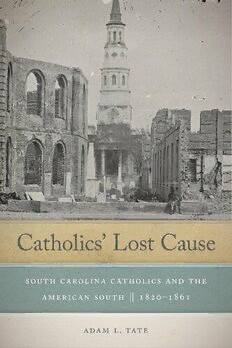
Catholics' Lost Cause: South Carolina Catholics and the American South, 1820/1861 PDF
Preview Catholics' Lost Cause: South Carolina Catholics and the American South, 1820/1861
Catholics’ Lost Cause Catholics’ Lost Cause South Carolina Catholics and the American South, 1820–1861 Adam L. Tate University of Notre Dame Press Notre Dame, Indiana Copyright © 2018 by the University of Notre Dame Notre Dame, Indiana 46556 undpress.nd.edu All Rights Reserved Published in the United States of America Library of Congress Cataloging-in-Publication Data Names: Tate, Adam L., 1972– author. Title: Catholics’ lost cause : South Carolina Catholics and the American South, 1820–1861 / Adam L. Tate. Description: Notre Dame, Indiana : University of Notre Dame Press, 2018. | Includes bibliographical references and index. | Identifiers: LCCN 2018036125 (print) | LCCN 2018042823 (ebook) | ISBN 9780268104191 (pdf) | ISBN 9780268104207 (epub) | ISBN 9780268104177 (hardback : alk. paper) | ISBN 0268104174 (hardback : alk. paper) Subjects: LCSH: Catholic Church—South Carolina—History—19th century. | South Carolina—Church history—19th century. Classification: LCC BX1415.S6 (ebook) | LCC BX1415.S6 T38 2018 (print) | DDC 282/.75709034--dc23 LC record available at https://lccn.loc.gov/2018036125 ∞ This paper meets the requirements of ANSI/NISO Z39.48-1992 (Permanence of Paper). This e-Book was converted from the original source file by a third-party vendor. Readers who notice any formatting, textual, or readability issues are encouraged to contact the publisher at [email protected] For Eugenie Contents Acknowledgments ix Introduction 1 one The Context of Catholicism in Antebellum South Carolina 13 two Spreading the Word 29 three Apologetics: Will the Real American Please Stand Up? 67 four An Identity of Our Own Making: Public Representations of Catholicism in Charleston 103 five Republicanism and Common Sentiments: South Carolina Catholics and Politics 131 six South Carolina Catholics and Slavery 167 Conclusion 203 Notes 211 Bibliography 255 Index 281 ACknowledgments One often works under the illusion that writing and research are solitary and lonely tasks. But such thoughts soon fade after considering the nu- merous people who contribute to one’s labors. I have incurred many debts while working on this project and wish to acknowledge a few of the many people who have assisted me. Three fellow scholars often listened to me and offered their advice. Kevin Schmiesing, my old friend, encouraged me frequently during the project and read the manuscript. His probing questions and careful eye for detail made me think through many of my assumptions. Nathan Cole man took time from his own work to read chapters of the manu- script as I was working on them. He assisted me greatly in honing my ar gument and rewriting awkward spots. He demonstrated his friendship by encouraging me throughout the process. I am greatly in debt to him. Finally, my good friend and colleague David Gilbert read the manu- script, asked pointed questions, offered critiques, and pushed me to write clearly. I could not have completed the project without his steady sup- port. All mistakes in the book, of course, are mine. Others too have supported the project. The librarians at Clayton State University, particularly Barbara Dantzler and Rhonda Boozer, fielded my many requests for materials. Archivists at Emory University, the Univer- sity of South Carolina, and the Archives of the Diocese of Charles ton, especially Melissa B. Mabry, provided critical assistance. My colleague R. B. Rosenburg helped me in the research process through his mastery of navigating numerous databases. My editor at the University of Notre ix
